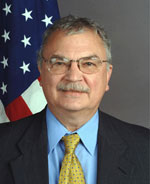A Quote by Morgan Ortagus
We call on the P.R.C. to remain focused on supporting international efforts to combat the global pandemic and to stop exploiting the distraction or vulnerability of other states to expand its unlawful claims in the South China Sea.
Related Quotes
The Philippines made a lawful and peaceful effort to resolve their maritime claims with China using the tribunal established under the Law of the Sea Convention (Unclos). The tribunal's ruling delivered a clear and legally binding decision on maritime claims in the South China Sea as they relate to China and the Philippines - and that ruling should be respected. We believe this decision can and should serve as an opportunity to renew efforts to address maritime claims peacefully.
The BRIC countries - Brazil, India, China, Turkey, South Africa, Indonesia even, and Russia - are now new actors. Over the last eight years, China multiplied by seven its economic presence and penetration in the Middle East. And if this happens on economic terms and there is a shift towards the East, the relationship between these countries and Israel is completely different from the United States. And it means that the challenges are going to be different, because China is not supporting Israel the way the U.S. are supporting Israel.
Obviously, the technology community in Massachusetts competes in a global economy, and our efforts to create a more competitive environment recognizes that competitiveness at a local level. We'd expect employers in other states to use this site as they consider where in Massachusetts to locate or expand their presence.
There's a national ambition, a collective, in a sense, political ambition, which I think is the thing we see from far away. That's the fact that China's building roads and airports and extending its reaches out into the East China Sea and the South China Sea, and in a way that's putting it into some tension with its neighbors.
I find Chinese debates about their political system domestically, but also about China's claims in the international system, to be among the most original and surprising and exciting of our time. The starting point is a system that none of us had anticipated, which I call Leninist capitalism, but also obviously because it is the most important emerging power. The question of China's relations with the United States in particular, and the rest of the world in general, is the question of war and peace in the 21st century.
So, I think that for the authorities to say now that calling for sanctions will prevent dialogue is a ploy to stop us from supporting sanctions. It has to be the other way around: dialogue first, then we stop our call for sanctions, because sanctions make people understand that you cannot exercise repression and at the same time expect international support.
































